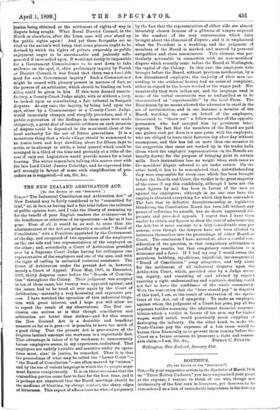BOETHITJS.
[To THE EDITOR 0? TIM "SPECTATOR."] SIR,—In your suggestive article in the Spectator of March 18th on " Three Rotten Cultures," you have emphasised your point at the expense, I venture to think. of one who, though not intrinsically of the first rank in literature, yet deserves to be remembered as a link of remarkable importance in the history of European thought and letters. When you say that of all the Roman culture under the later Western Emperors "nothing came," are you not forgetting Boethins, who, born perhaps in the very year (A.D. 476) when the line of Western Emperors came to an end, was the very flower of this culture of the Roman nobility ? Gibbon's estimate of the "Consola- tion of Philosophy" as "a golden volume not unworthy of the leisure hour of Plato or Tully," is no doubt an exaggera- tion, but the commanding position of the work throughout the Middle Ages bears witness to a real merit. When the more classical literature of Greece and Rome was almost unknown, we find the " Consolation of Philosophy " influencing the birth of every great vernacular literature of Western Europe. We all know how Alfred the Great made an Anglo-Saxon version of it, and how Chaucer translated it into English. The earliest writing in Pro- vençal and the chief source of our knowledge of Old High German are translations of it.. It afforded spiritual com- fort to Dante in the dark hour of his life. More influ- ential still was the strictly philosophical work of Boethius. Among the Romans of the fifth century Aristotle was un- known. It was the work of Boethius that began the memor- able ascendency of Aristotle over the mind of the Middle Ages, and till the end of the twelfth century brought the Arabic versions into notice he was Aristotle's sole interpreter. It was a passage of his that gave rise to the great nominalist and realist controversy. He was at the foundation of the whole of medimval scholasticism. In brief, both in literature and in philosophy, Boethius, the last product of a culture that cannot have been wholly rotten, became to the Middle Ages the chief interpreter of the culture of the ancient world. He was the intellectual light of a thousand years, and only waned before the growing dawn of the Renaissance.—I am,







































 Previous page
Previous page